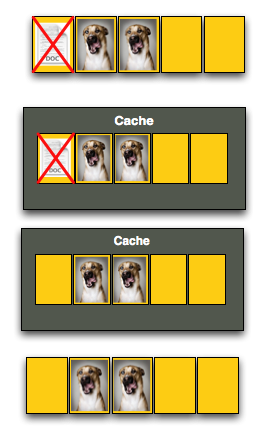The SSD Anthology: Understanding SSDs and New Drives from OCZ
by Anand Lal Shimpi on March 18, 2009 12:00 AM EST- Posted in
- Storage
The Trim Command: Coming Soon to a Drive Near You
We run into these problems primarily because the drive doesn’t know when a file is deleted, only when one is overwritten. Thus we lose performance when we go to write a new file at the expense of maintaining lightning quick deletion speeds. The latter doesn’t really matter though, now does it?
There’s a command you may have heard of called TRIM. The command would require proper OS and drive support, but with it you could effectively let the OS tell the SSD to wipe invalid pages before they are overwritten.
The process works like this:
First, a TRIM-supporting OS (e.g. Windows 7 will support TRIM at some point) queries the hard drive for its rotational speed. If the drive responds by saying 0, the OS knows it’s a SSD and turns off features like defrag. It also enables the use of the TRIM command.
When you delete a file, the OS sends a trim command for the LBAs covered by the file to the SSD controller. The controller will then copy the block to cache, wipe the deleted pages, and write the new block with freshly cleaned pages to the drive.
Now when you go to write a file to that block you’ve got empty pages to write to and your write performance will be closer to what it should be.
In our example from earlier, here’s what would happen if our OS and drive supported TRIM:

Our user saves his 4KB text file, which gets put in a new page on a fresh drive. No differences here.

Next was a 8KB JPEG. Two pages allocated; again, no differences.
The third step was deleting the original 4KB text file. Since our drive now supports TRIM, when this deletion request comes down the drive will actually read the entire block, remove the first LBA and write the new block back to the flash:

The TRIM command forces the block to be cleaned before our final write. There's additional overhead but it happens after a delete and not during a critical write.
Our drive is now at 40% capacity, just like the OS thinks it is. When our user goes to save his 12KB JPEG, the write goes at full speed. Problem solved. Well, sorta.

While the TRIM command will alleviate the problem, it won’t eliminate it. The TRIM command can’t be invoked when you’re simply overwriting a file, for example when you save changes to a document. In those situations you’ll still have to pay the performance penalty.
Every controller manufacturer I’ve talked to intends on supporting TRIM whenever there’s an OS that takes advantage of it. The big unknown is whether or not current drives will be firmware-upgradeable to supporting TRIM as no manufacturer has a clear firmware upgrade strategy at this point.
I expect that whenever Windows 7 supports TRIM we’ll see a new generation of drives with support for the command. Whether or not existing drives will be upgraded remains to be seen, but I’d highly encourage it.
To the manufacturers making these drives: your customers buying them today at exorbitant prices deserve your utmost support. If it’s possible to enable TRIM on existing hardware, you owe it to them to offer the upgrade. Their gratitude would most likely be expressed by continuing to purchase SSDs and encouraging others to do so as well. Upset them, and you’ll simply be delaying the migration to solid state storage.










250 Comments
View All Comments
Hrel - Thursday, April 9, 2009 - link
although, I have some issues which I have put in an e-mail sent to Anand; can't wait for you response.Hrel - Thursday, April 9, 2009 - link
Instead of making me dinner can you send me that test system instead??? Please!!!Hrel - Thursday, April 9, 2009 - link
I was wondering what controller the OCZ solid Series is based on??? Will I experience hiccups with that drive or not? Is the point of my question.sfisher64 - Wednesday, April 8, 2009 - link
I just purchased a Dell Latitude E6400 with a 64GB Ultra Performance Solid State Drive. Does anyone know what type of drive this is, and where it fits in the spectrum described in this article?Baffo - Saturday, April 11, 2009 - link
The Dells use the Samsung drives (you should see this on the bottom if you pull it out). However, as much as I wish this was one of the newer controllers (I have a few of these at work as well), the testing cycles demanded by Dell probably mean these are the older controllers.marraco - Tuesday, April 7, 2009 - link
This article is popular :)BLHealthy4life - Monday, April 6, 2009 - link
Intel 9.1.1.1010 (Intel) Where are these drivers? I can only find version 1007 and not 1010....Thanks
BLHealthy4life - Sunday, April 12, 2009 - link
found it....Intel obviously keeps the X58 chipset drivers current for their own boards, just not other mfgs boards....
They installed fine on my R2E..
BL
irondukes - Friday, April 3, 2009 - link
Hi-- Do SLCs suffer from performance degradation, or are the controllers pretty agressive at erasing the data since they have far longer read-write cycles? Please help! Deciding between an X25E and X25Mmdavies - Friday, April 3, 2009 - link
I'm reading this about a day late - got my Patriot PE256GS25SSDR 2.5" 256GB yesterday since I'm bad about destroying hard drives. this drive, in a word, was excruciating. I'll be replacing it with one of your recommended drives today.Thanks